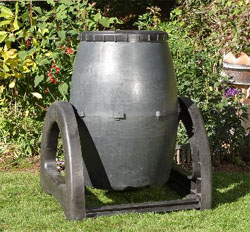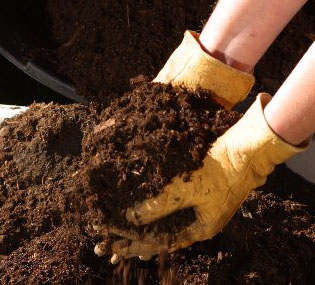Composting Basics and Why You Should Do It
Plants need more than just the nitrogen, phosphorous, and potassium, found in most so-called "balanced' fertilizers. They need dozens of micronutrients to grow strong and stay healthy.
Additionally plants benefit from being in an organically active soil. Organically active soil helps prevent bacterial and fungal diseases, and of course having organic matter in the soil attracts earth worms which further enrich the dirt.
The one product you can get that adds all of these features is compost. You can buy compost at the store, usually it is composted cow manure, and it is fine, but generic. You're just basically getting the same nutrients found in the stuff the cow eats. Homemade organic compost made from yard waste and kitchen scraps is much more diverse in it's nutrient load, giving plants every little micronutrient they need. It is also free.
First Steps for Composting

Our tumbler, the best you can buy.
The first thing you need is a place to compost. Those with large properties can make free form piles or large bins made with wire fencing. However for most of us living in cities and suburbs we need a smaller solution. The answer is the home compost bin or tumbler. Now obviously this site sells tumblers, and tumblers are the better option. Compost Tumblers:
- Keep the compost fully enclosed, whereas many bins are open on the bottom. This keeps the rodents out.
- Provide an easy way to turn and aerate the compost with a fraction of the effort of manually turning a bin.
- Provide an easy way, via dumping, of extracting the finished compost.
- Work fast, a tumbler can produce results 20x faster than a bin!
- Some cities or municipalities do not allow compost piles as they attract rodents, so if you live in such a location you have to use a fully enclosed bin or tumbler.
So, you should buy a compost tumbler, maybe even 2. You see compost tumblers work fast but they work in batches. When one batch is going you shouldn't add to it. So it is best to have 2 so that while one is going you can add to the other, then every 2 weeks when the compost is done you rotate.
Composting Ingredients
Your first ingredient should be some finished compost, you can borrow this from a gardening friend, or buy it. The point of this is to get the organisms responsible for breaking the organic matter down into compost a head start in getting established.

Leaves are a great brown ingredient.
Then you'll want to add both brown and green organic matter. Brown organic matter represents carbon, and you'll want a lot of it, at least double of what you add in green organic matter. The most common source of brown organic matter is dead leaves, but any dead plant material works, so long as it is not too woody (you can compost woody things, but they take much longer to break down, for best results try grinding it or cutting it up first). Sawdust from non-treated lumber or logs is also an excellent source of carbon.
If you have problems getting enough brown material, consider buying an electric wood chipper you will be able to chip up small branches, the woody stems of perennials, trimmings from your bushes and vines, etc. And create a large amount of brown material for your composter.
Then you'll want to add green matter, which actually includes any recently living or moisture filled organic waist. All your kitchen scraps, pulled weeds, cut plants, or grass clippings can be considered green matter. This green matter represents nitrogen mostly. If you add too much of it, or do not add enough brown, your compost might smell. So if your compost smells you know you need to add more brown or less green.
Among kitchen scraps you can add any fresh fruit or vegetable parts, including rotted food you will not finish. You can also add egg shells or crustacean shells. Technically it is possible to compost other animal products as well, but they attract animals and rodents and can smell and all told aren't worth it. Also, do not compost any cooked or canned foods, even vegetables, that have been salted. Salt kills the organisms that will be decomposing your yard waste.
The final ingredient is water. You want the pile to be moist, but not wet, like a wrung out sponge.
Finished Compost
Finished compost is often called brown gold or garden gold by gardeners, and with good reason. It is extremely beneficial to your plants.

Brown Gold
When your compost is done you can dump it out of your tumbler, leaving a little bit inside as the starter for your next batch. If there is any brown liquid inside, this compost tea is also beneficial and you can drain it off or leave it in to help get the next batch going.
Now you have a couple options as to what to do with it. Often people will sift the compost the small grains of finished compost will pass through a screen, larger chunks of organic matter will not. You can do this and it is fine, but if you're using it as a soil amendment a few pieces of larger unfinished compost is fine and beneficial to the soil as it will attract earth worms. Some people though will spread the compost over their lawn and in these cases the larger chunks would not be wanted and should be put back in the composter for another cycle.
If the compost is not quite finished, for instance if you can still make out larger leaf pieces, you can still use it. Just use it as a soil topping, instead of a direct amendment. In this way it acts very much like a mulch and the nutrients will still get down to the plant roots. After all, if you're not planting a new plant, this is the main way you'll get your compost to your plants.
You can also use your compost to make compost tea, which I mentioned above. Simply take a bunch of compost (you can put it in a burlap bag or other water permeable bag if you have it) and put it in a 5 gallon bucket of water, letting it soak overnight. You could also, if you like, get an air infuser like is used for a fish tank and place that in as well. You will then have compost tea. This tea can be used as a foliar feeder and sprayed directly on plant leaves.
So what are you waiting for? Buy a Compost Tumbler.
| All our products are made in the USA at factories in California & South Carolina. |  |
Have a question? Contact Us